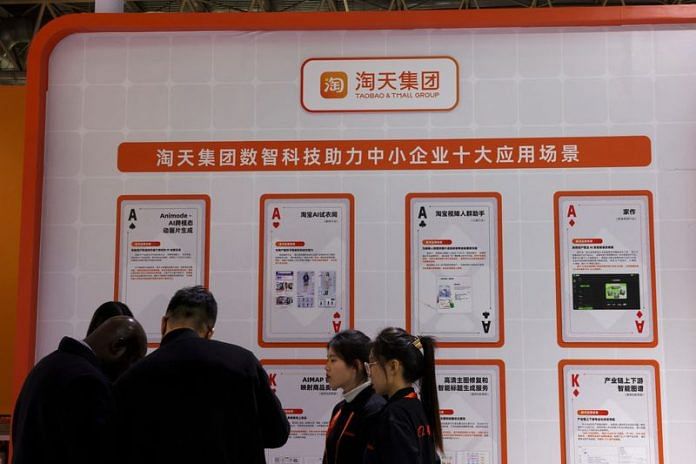By Casey Hall
SHANGHAI (Reuters) -Alibaba Group CEO Eddie Wu will take over as chief executive of domestic e-commerce arm Taobao and Tmall Group effective immediately, the company said on Wednesday, boosting his direct control over the group’s core businesses.
Wu, who has been Group CEO since September, also took over from previous head Daniel Zhang as the company’s cloud business CEO that month. The latest appointment means Wu now leads the overall group as well as its two most important business divisions – cloud and domestic e-commerce.
The company’s Hong Kong-listed shares rose as much as 4% by midday on Wednesday.
Trudy Dai, previously the Taobao and Tmall Group CEO, would shift roles to assist in the establishment of a new asset management company “as part of ongoing efforts to improve return on capital,” according to an internal company letter seen by Reuters and signed by Joseph Tsai, who took over as group chairman from Zhang in September.
An Alibaba spokesperson confirmed plans to set up a new asset management company and that Dai would be involved.
Dai, Wu and Tsai are all Alibaba Group’s co-founders and long-time lieutenants of former chief Jack Ma.
Wu last month briefed analysts about Alibaba Group’s future strategy, saying the company would conduct a review to distinguish between “core” and “non-core” businesses.
“Core businesses are where we will keep our long-term focus, intensively invest resources, pursue R&D, enhance user experience,” he said in a post-earnings call.
In the largest restructuring in Alibaba’s 24-year history, the company in March was broken up into six units managed by the group as a holding firm.
In May, it announced the cloud unit would be among the first of the divisions to spin-off and go public. That plan was shelved last month, with the company citing uncertainties over U.S. curbs on exports to China of chips used in artificial intelligence applications.
Alibaba’s domestic e-commerce platforms Tmall and Taobao remain China’s largest, but have been losing market share in recent years to fast-rising competitors like PDD Holdings’ Pinduoduo.
This year in particular, weak consumer sentiment in China stoked by economic insecurity and a slower-than-expected retail recovery following the lifting of COVID-19 curbs a year ago created what Dai described as a “value for money battle”.
(Reporting by Casey Hall; Editing by Jacqueline Wong, Muralikumar Anantharaman and Jamie Freed)
Disclaimer: This report is auto generated from the Reuters news service. ThePrint holds no responsibilty for its content.



